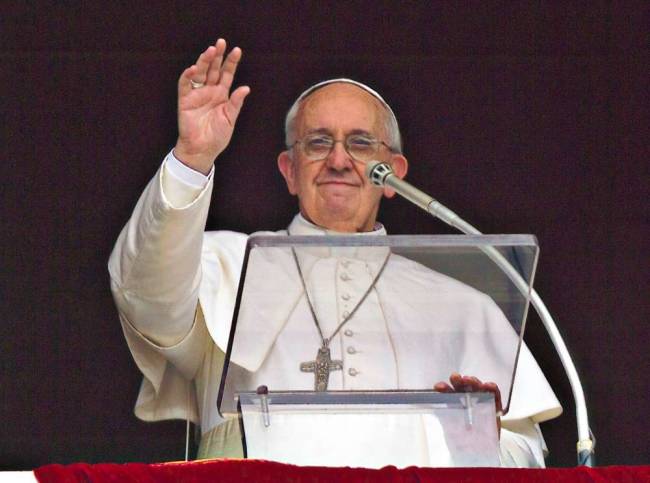Pope Francis Sends a Cardinal to a Napoleonic Exile
By Alfred P. Doblin
THE WORD “miracle” is often used in the Catholic Church. In October, Pope Francis beatified Pope Paul VI, the first step toward sainthood. Popes John XXIII and John Paul II were canonized saints in April of this year. Two miracles must be attributed to a candidate for sainthood. The process focuses on miracles affecting individuals; one affecting an institution may be occurring before our eyes. Francis, elected by a body of cardinals mostly selected for their conservative views and lack of personal charisma, is emerging as the most progressive, charismatic pope since John XXIII. If this isn’t a miracle, I’m not sure what qualifies. On Saturday, Francis demoted Cardinal Raymond Burke, not a household word in America unless you live in St. Louis where Burke was once archbishop. Burke was a favorite of previous popes because he is a hard-line conservative. He railed against Catholic public officials who supported a woman’s right to choose. Burke believed those opinions were sufficient reasons to deny those Catholics communion. Burke was sent to the Vatican where he once was on the committee that recommended who would be named bishop. Francis removed him from that committee. Burke also was the head of the Vatican’s highest court. Francis removed him from that post last week and then made him the new cardinal protector of the Sovereign Order of Malta. The Knights and Dames of Malta are loyal Catholics, and usually not without substantial financial means. It is a nice title for a lay person indeed, but the cardinal protector doesn’t have much to do. Pope Francis sent his Napoleon into exile. This is a most telling sign that Francis understands to move a ship he needs to lighten it. The recent synod of bishops in Rome appeared a dismal failure when it came to reform. A working document made public showed a shift in tone toward divorced Catholics remarried in civil ceremonies and toward gay couples raising children. Immediately upon its release, conservative bishops and cardinals pushed back. The draft document’s language was amended in English and the final document offered little hope of a rapprochement toward disaffected Catholics. The bishops went back to their dioceses to further discuss the issue and will meet again next year in the Vatican. A recommendation will be made to the pope and then he will make his own assessment. A pope’s legacy is determined by two things: By the pronouncements he makes while alive and by the actions of the men he names bishops and cardinals who will live long after his papal reign. In the case of Cardinal Burke, the rain shows no signs of abating. Some speculate Burke is like Napoleon on Elba, not St. Helena. Burke has not been silenced and will have access to some of the richest and most conservative Catholics in the world. That is true. But while some cardinals and bishops may be unhappy with their pope, they will not defy him. The very fact that most of them are remarkable for not being individually remarkable ensures that a charismatic pontiff could drastically change the status quo if he wanted to do just that. It just has been a very long time since there has been such a pope. A colleague asked me how it was possible for this Francis to become pope in such a church. I responded the same way it was possible for Archbishop Oscar Romero of San Salvador to rise from obscurity as a minor conservative prelate to a defender of human rights, martyred while saying mass. In theological terms, it is sign of a “grace” working within the Catholic Church. For people like me, it’s close to witnessing a miracle, if not the real thing. Removing Burke from the Apostolic Signatura, the Vatican’s equivalent of the U.S. Supreme Court, was a big deal, but removing him from such a post and placing him in a ceremonial one was huge. In a church all about symbols, Francis made a strong statement. None of this bodes well for bishops who refuse to get on board the Francis Express. Newark Archbishop John Myers’ lavish retirement home, more suitable for a Real Housewife than for a shepherd, may be out of the headlines at the moment, but I do not suspect it will remain forever unnoticed by Francis. And it would be interesting to see whether Myers’ mansion is still an archdiocesan asset if the pope visits the metropolitan region in 2015. Francis is unlikely to do anything heretical. There will be no recognition of same-sex marriage. No women ordained priests. I suspect there will be a change of tone toward gay couples. There will be more acknowledgement of the vital role women play in the life of the Church, but it will stop short of ordination. The most possible change is a rethinking of the annulment process and perhaps offering a path toward remarried divorced Catholics to receive communion. Vatican theologians are very good with language – they have been most effective at keeping some Catholics out. But those same skills could be used to bring people in instead. Francis is not a young man, but he is not ready for retirement. And sometimes the charismatic man who “opens a window” is followed by someone who at the time appears like just another bureaucrat, but is later to be revealed as the person who made the changes envisioned by his predecessor a reality. That was the case with Pope Paul VI who followed John XXIII. Paul VI is one miracle away from sainthood. Francis may be one step away from a miracle. And Cardinal Raymond Burke is in step with the knights and dames of Malta, an island, by the way, of about equal in size to Elba.
|
.
Any original material on these pages is copyright © BishopAccountability.org 2004. Reproduce freely with attribution.
